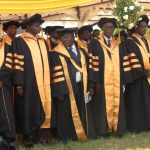Bachelor of Arts in Journalism (BA Journ)
BA Journalism programme has been designed to respond to societal needs and national aspirations. On one hand, the society need to be timely informed on intelligent account of the day that affect their lives, to be educated on various local, national and international issues, to be entertained and to participate on their self-governance. On the other hand, the government needs thorough trained journalists in order to realize national economic, social and political aspirations. Journalists are important in realizing national aspirations because they act as a bridge between the government and citizens as well as a system of check and balance towards the realization of the national aspirations. Without journalists, societal needs and national aspirations can hardly be achieved.
The program aims at producing competent journalists who can contribute to the attainment of the afore mentioned societal needs and fulfilment of national aspirations. Therefore, the programme provides opportunities for any individuals who aspire to become journalists and those already in-service who intend to broaden their scope of knowledge and advance their career.
Programme Summary
Course Name: Bachelor of Arts in Journalism
Course Initials: BAJ
Duration: 3-6 Years
Total Units: At least 36
Mode of Delivery: Blended
Programme Informations
Option (I): Direct Entry Scheme (Form VI) Qualifications.
Possession of Certificate of Secondary Education Examination (CSEE) or equivalent, with at least four passes in approved subjects, And He/she has obtained at least two principal passes with a total of 4.0 points in any subjects in the Advanced Certificate of Secondary Education Examination (ACSEE).
Option (II) Equivalent Qualifications
Any Diploma recognized by TCU with an average of ‘B’ or GPA of 3.0 with not less than four passes at ‘O’ Level
OR Certificate in Foundation Programme (ANY) offered by the Open University of Tanzania with at least GPA of 3.0.
OR Bachelor’s degree/Advanced Diploma from a recognised University/Institution
Level 1 (year 1)
Level 2 (year 2)
Level 3 (year 3)
|
General Fees for Bachelor Degree Programmes
No | Item | Local (Tsh) | EAC/SADC (USD) | Non-SADC/EAC (USD) |
1 | Registration Fees | 30,000 | 30 | 30 |
2 | Examination fees paid per paper (Test & Exam) | 10,000 | 20 | 40 |
3 | Student Organization fees (annually) | 20,000 | 20 | 20 |
4 | Student Identity card | 20,000 | 20 | 20 |
5 | Quality Assurance Fee (annually) | 20,000 | 20 | 40 |
b: Tuition Fees per Unit (or per 10 credits) for Bachelor Degree Programmes
No | Item | Local (Tsh) | EAC/SADC (USD) | Non-SADC/EAC (USD) |
1 | Theoretical course by distance mode | 60,000 | 40 | 80 |
2 | Field Practice | 100,000 | 70 | 140 |
3 | Project/dissertation | 100,000 | 70 | 140 |
Mr. Libe Chonya
Email: libe.chonya@out.ac.tz
Mobile: 0684399997
The programme provides opportunities for any individuals who aspire to become journalists and those already in-service who intend to broaden their scope of knowledge and advance their career. Also, this programme intends to offer prerequisite requirements necessary for academic progression to higher degree.
The distribution of marks for each course is 30% for Main Timed Test (MTT) and 70% for Annual Examination (AE). At the end of each academic year, a student failing a course or more than one course is allowed to take a supplementary examination in the failed subject(s). If the student fails again after doing supplementary examinations is given a chance to repeat the course. A pass in supplementary and repeat examination is recorded as ‘C’ whatever the marks scored by the candidate.



